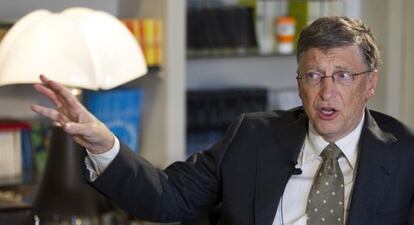“It’s strange that wages in Spain don’t fall with all that unemployed labor”
Microsoft founder Bill Gates talks to EL PAÍS about the Spanish economy and aid funding

Bill Gates met with Spanish Prime Minister Mariano Rajoy on Wednesday to deliver the message that despite the ongoing economic crisis, Spain can continue to have a dramatic impact on the lives of the planet’s poorest people if it maintains its aid programs and focuses on the most deprived regions of the world.
Before traveling across Madrid to Rajoy’s La Moncloa residence, Gates gave an interview to EL PAÍS journalists in which he combined an appeal for well-targeted aid funding and his perplexity at the inability of Spain to solve its economic problems. He would ask Rajoy, he said, to spend up to one percent of the government budget on international aid, while praising Spain for its prior commitment to helping the Bill & Melinda Gates Foundation in its efforts to lift people out of poverty and eradicate the world’s major killer diseases, notably malaria, polio and AIDS.
“I know he has a lot of priorities right now, and that these are tough times, but if he wants to spend that one percent and focus it on those most in need, the impact will be dramatic,” said the man who co-founded Microsoft along with Paul Allen.
Gates was at pains to explain that the impact of the same euro of funding in the very poorest countries, such as Chad, Sudan, Ethiopia and Mozambique, was far greater than in other aid recipients who, at least in terms of potential, have enough economic resources to solve their own poverty issues. Peru and Morocco were two examples Gates cited, although he praised the former for having gone a long way toward reaching the Millennium Development Goals largely on its own steam.
“For the funds to have a real impact, they should go to those most in need,” Gates said. “We must make sure the money goes to the poorest countries where it can have a dramatic effect, and not to middle-income countries.”
“Spanish taxpayers,” he added, could feel “good about the country’s role in the world.”
After the meeting at La Moncloa, a government statement said that Rajoy had given assurances to Gates that Spain would keep up its commitment to development aid within its current financial constraints. However, a study released on Tuesday by the Seek Development consultancy revealed that official Spanish aid spending in 2012 will drop by some 900 million euros, around 20 percent.
Still, Gates praised the research work being carried out in Spain on a vaccine for malaria, singling out the group working out of Barcelona under scientist Pedro Alonso.
On the country’s current economic problems and high unemployment rate, the businessman and philanthropist was less kind. “It’s strange in that wages have not fallen. If you have a factory that produces coal and no one is buying your coal, then it’s obvious that the price of that coal is too high and you have to bring it down. You have all that labor available, but there is something stopping that equilibrating and other countries moving in when you have all these people willing to work. That level of unemployment tells us that there are some rigidities operating in the labor market.”
Asked for his view on the technocratic prime ministers recently installed in other European nations such as Greece and Italy, Gates said that such a leader had an advantage over a traditional political representative in that he can take “tough decisions.”
“I am not a technocrat who has closely studied the situation of Spain, but there is probably a once-in-a-lifetime opportunity to take those difficult decisions to create the flexibility typical of the labor markets in Ireland, the United Kingdom and the United States.”
On a more global level, Gates talked about unemployment as a “structural” problem: “There are plenty of jobs to do, in teaching, science, tourism and looking after the old. There is no shortage of work but it is a question of structuring it right.”
Gates said that he was sanguine about the suggestion of introducing taxes on financial transactions as long as they do not “distort the market too much.”
“When you set up these taxes, the question is, ‘What do you spend the money on?’ They are government funds, so they could be used to pay off the debt, stimulate the local economy or to maintain that one percent [of the budget] that keeps people from dying because you stopped buying them mosquito nets.”
Asked if he agreed with fellow US billionaire and philanthropist Warren Buffett’s suggestion that the US’s richer citizens all start paying 30 percent tax, Gates said he was “fine with it,” but that on its own such a measure would not solve Washington’s deficit problem. He said that the middle and upper-middle classes would also have to accept a moderate tax increase.
Tu suscripción se está usando en otro dispositivo
¿Quieres añadir otro usuario a tu suscripción?
Si continúas leyendo en este dispositivo, no se podrá leer en el otro.
FlechaTu suscripción se está usando en otro dispositivo y solo puedes acceder a EL PAÍS desde un dispositivo a la vez.
Si quieres compartir tu cuenta, cambia tu suscripción a la modalidad Premium, así podrás añadir otro usuario. Cada uno accederá con su propia cuenta de email, lo que os permitirá personalizar vuestra experiencia en EL PAÍS.
¿Tienes una suscripción de empresa? Accede aquí para contratar más cuentas.
En el caso de no saber quién está usando tu cuenta, te recomendamos cambiar tu contraseña aquí.
Si decides continuar compartiendo tu cuenta, este mensaje se mostrará en tu dispositivo y en el de la otra persona que está usando tu cuenta de forma indefinida, afectando a tu experiencia de lectura. Puedes consultar aquí los términos y condiciones de la suscripción digital.








































